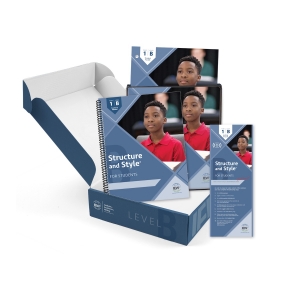
What to Do BEFORE the GED® if your child is still under age 17.
Many parents, homeschooling with children in their early teens, ask what they should do at this stage to prepare their children for the GED® tests. Candidates must be age 17 or older to write the GED®. This page describes some recommended curricula to use before the child enrols with Go Prep™ (previously called Online GED Prep™) as well as tips to help motivate teens to make good study choices.
This page focuses on what to do with teens in the early high school years. For children in the primary grade, there are curriculum recommendations here: Primary Grades Pre-GED
Deschooling? What is it and why is it necessary?
If your family is new to homeschooling, you should first spend a couple of months deschooling.

Deschooling refers to a ‘detox’ from the school system, where you take some time out from formal lessons. You break away from the old habits, routines and mindsets that come with mainstream schooling and you establish new routines in the home and allow the children freedom to discover and pursue new interests and hobbies.
Many children also need this time to start healing emotionally from any hurts, labels or other damage to their self-esteem, which they experienced during their time at school. There is no deadline in life. Your children will not get ‘behind’ during this season. They will be learning about real life, their life! Your goal should be to raise up a child who is emotionally healed and whole, who believes they can succeed at whatever they choose and who is confident and ready to face life as an adult.

Encouraging unmotivated teens
At this age, it is quite common for a teen to lose all interest in their studies. It is a time when they are establishing their identity and autonomy as a young person. If they are unmotivated to learn, parents feel panicky, fearing that their child will drop-out and never amount to much.
This is a time to talk to your child reasonably and calmly about your fears, yet give them some choice and responsibility for their own lives.
Successful people never drop out of learning, but many of them find alternatives to the status quo. They find alternatives to the traditional routes don’t suit them or don’t appeal to them. If your child feels this way, challenge him or her to find things to learn that DO interest them. These can be things that are NOT school subjects – perhaps making videos to share on social media about their passion, cooking, growing organic vegetables, coding, renovating old furniture, art, music, photography, cycling, kite-flying, sewing, breeding pets, buying and selling second-hand goods or you-name-it.
The advice of the late Leendert van Oostrum, comes to mind, “LOS DIE KIND!” Give your child some time and space to figure out what he or she wants to do, without you nagging or showing disapproval. Sometimes it takes about 2 years for a child to find a new direction and new motivation. During this time, keep sending them the message that you believe in them, you recognise their potential and you will support them on their new road to success, when they find it. Read Encouraging Teens to Own their Lives
Successful people never drop out of learning.
Ask your child what to do before the GED®
Ask them what subjects and skills they think they
- NEED to become a successful, self-supporting adult and
- what subjects or skills they would LIKE to learn because of their own talent or interest.
Help them to research the resources they need to learn these things and allow them some choices in the decisions that you make. Deciding on the pros and cons of each option is a life skill they can practice.
You are no longer in the system. You can give your child a customised education and pick up a GED® credential along the way!
One of the great advantages of the GED® is that there is no prescribed curriculum that you must follow in the years before you write the test. Families choosing the GED® have more time and freedom to let their children explore the things they are interested in, and then just do the necessary prep to “jump through the GED® hoop” in order to get that credential.
The GED® tests four subjects, so it makes sense to keep up skills that will be necessary for those four tests. Suggestions of recommended curriculum products follow.
What’s on the GED® Test?
See what’s on the GED® Test for each subject.
Recommended curriculum products to use before the GED®

Update December 2020
We now offer the GED Beginners course for Maths and English for 15 year olds
I. Mathematical Reasoning

GED® test candidates must have mastered Algebra and 2- and 3-dimensional Geometry in order to pass the GED® Mathematical Reasoning test.
There is a huge variety of maths curricula, which are well-recommended by homeschoolers. All of them work, so you can choose whatever you prefer.
Shirley recommends Math-U-See, including Algebra 1 and Geometry, but you can choose any alternative that suits your preference or your budget. Take a placement test and start at the level that best matches the student’s current abilities. Read Shirley’s article: 10 Reasons Why We Love Math-U-See
2. Science
The GED® tests mainly SKILLS, rather than the knowledge of any specific curriculum or content.

Launched in 2022, Footprints Nature Quest is a fantastic natural sciences and geography programme based on literature. It’s a story-driven exploration of South Africa using stories to study what the GED calls life science or the school system calls biology, but its so much more than just that!
If you want your children to improve their reading comprehension and thinking skills, which are essential for the GED, this is a great way to do that. Plus you will have fun at the same time and share outdoor experiences in your local environment. Keep the screens and online learning for later and enjoy real-life learning and relationship-building, while you still can!

Other options to develop science skills before the GED®, that Shirley recommends are the Apologia science books by Dr Jay Wile. You can start with General Science, then Physical Science, followed by any others of your choice, if your time allows.
Again, any alternative reputable science programme that will develop your child’s knowledge and skills in this subject should be adequate.
3. Reasoning Through Language Arts (RLA)
For English, as with the other subjects, you can choose the materials that you prefer or try our recommendations. On the RLA test, a student must type a 5 paragraph argumentative essay, so it is vital to learn to structure a good essay. This is a skill that takes time to practice and master.
The argumentative essay question on the test asks candidates to evaluate two passages which present opposing points of view on a given subject. The candidate must decide which viewpoint best supports its arguments and then write an essay presenting evidence from the passages to support this decision. It’s a complex skill that needs to be practiced and developed over time.
Since so many students struggle with this skill, Shirley created a short tutorial, Acing the Argumentative Essay, with resources to teach essay skills plus three practice essay topics.
All my students are also using it when they do English. It is extremely helpful.
Jenny Moore, Principal of Haven Academy, Student Support Centre

For general grammar and writing skills, we recommend the two choices:
1. Writing with Skill
OR
2. Structure and Style programme (previously known as Student Writing Intensive) from Excellence in Writing in USA.
Shirley also recommends reading aloud together daily. By reading aloud together, your children will be exposed to good vocabulary, complex grammar and sentence construction, figures of speech and a whole lot more and this will gradually build the database of language in their brains. As they mature, they will be far better equipped to produce good language of their own because of this.
Stories are also about characters and how they overcome and solve problems – relationship issues, overcome fears or enemies and these are good life lessons for our children. As you read, encourage them to think critically about the story or text.
The Reasoning Through Language Arts test requires candidates to understand the deeper meaning of texts – things like inferences and suggestions…so again you can use reading aloud together and discussing what you read critically to develop reasoning and thinking skills.
4. Social Studies
Footprints – The Last Century is a South African social studies curriculum that Shirley co-authored. The assignments and activities are aimed at children between ages 10-14 but older teens will find it stimulating and challenging too as good literature knows no age limits. This programme is designed specifically to teach children to consider opposing perspectives on history and current events. It is aimed to develop critical thinkers who are media-savvy citizens of the 21st century! It’s ideal preparation for the GED!
A good follow-on after Footprints would be Sonlight’s Core F – Eastern Hemisphere Nations or Core G – World History or any other Sonlight Core you fancy.
Otherwise, read aloud whichever books you would like to with your children.
For an overview of American History that is not tedious or heavy-going, try Don’t Know Much About History: Everything You Need to Know about American History but Never Learned by Kenneth C. Davis. You can order it from online bookstores.
Here’s a child-friendly website too: Ben’s Guide to American Civics and Government


10 Things to Do Before the GED
Need more ideas about what to do before the GED®? This article lists more than ten things to consider doing with younger students, which will add value to their lives and further their life-long education.
Age 16 or older – Online GED Prep at Go Prep™
Just because a candidate may write the GED® tests at age 17 doesn’t mean she should. You need to decide when your child is ready and have a plan for what she will do afterwards.
Once your child is age 15 or older if you like, you can enrol with Go Prep™. The online programme will assess the student’s starting level and then assign an individualised learning pathway to help the student develop and master all the skills needed to pass the GED® tests.





